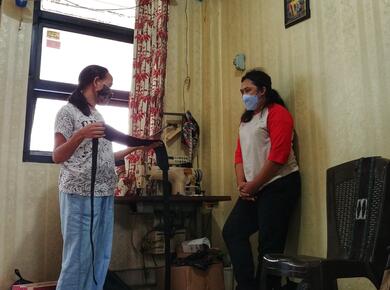Posted: September 15, 2021
*These suggestions come from a North American pastor; in other cultural contexts, variations on practices will exist. See below for comments from around the world.
On a cold wintry night in the middle of February around a decade ago, I arranged five chairs at the table for our committee meeting. One person came in looking wretched; she blew her nose and sneezed through the whole meeting. I felt like moving my chair away, but I didn’t want to be rude. At the end of the meeting she said, “I thought about not coming because I’ve got this terrible cold, but it was difficult to schedule this meeting.”
I got very sick two days later and so did someone else who was there. We both had to take time off work.
I wished that the sick woman had phoned or emailed, saying, “I have a bad cold, do you still want me to come?” We could have made the decision together. Instead, we weren’t given an option; we didn’t consent to taking that health risk.
How do we create safe and healthy spaces together? Many churches think about safety in relation to sexual abuse, and have worked on safe space policies in that context. What does safe space mean in the light of COVID-19?
Consent culture
When government-mandated, physical-distancing sanctions ease, and churches start meeting in person again, our communities will need to negotiate boundaries about health. We won’t know who has had a vaccine, and who has not, or what people’s underlying health conditions might be. We won’t know who wants to maintain physical distancing.
With their existing safe space policies, some churches have cultivated a “consent culture” about physical contact. Instead of assuming everyone wants a hug, you can ask before you touch people. Being asked and giving permission means that everyone feels respected and safe.
How can respect and careful communication help us negotiate each other’s boundaries around health?
In large group settings, the church may mandate rules: “Everyone must wear a mask when we worship together.”
But small group meetings and social gatherings can be awkward if we make assumptions.
Asking questions is important. “Are you physical distancing, or is a handshake good?” “Can we have this council meeting virtually, or would you prefer an in-person meeting?”
We can create a habit of checking-in before we meet, to gauge how we interact.
How we frame things matters. If I say, “Can I hug you?” it can be socially awkward to answer, “No, I don’t want a hug.” That’s why framing a question where all options are fine is a best practice: e.g., “Is shaking hands good, or would you prefer a hug?”
Respecting decisions
Consent culture is not about explaining why; it’s about respecting decisions.
If someone doesn’t want a hug, we don’t ask, “Why don’t you want a hug from me?” That would be intrusive.
Similarly, we should not expect people to divulge their health situation and choices. It’s intrusive to ask whether someone is vaccinated, or why they can’t or won’t.
If people want social distancing or masks, we should offer that with no judgement. We do not know why; we just comply out of respect.
Many people are tired and frustrated because of the pandemic, and want life to go back to normal. Others are living with ongoing health risks.
What does it mean to be the church in this pandemic reality? Unwillingly exposing others to our viruses will be a stumbling block, which not only endangers their health, it also means that the community doesn’t feel safe for them.
Creating safe spaces is part of being the church, and that includes cultivating a consent culture in which we ask good questions and go the extra mile to accommodate everyone.
Carol Penner teaches practical theology at Conrad Grebel University College, Waterloo, Ontario, Canada, and has a blog of worship resources at leadinginworship.com. This article originally appeared in Canadian Mennonite’s 24 May 2021 print issue.
| In Colombia, people take cues from each other’s body language. Perhaps the person who prefers more distance takes the initiative to establish it. For example, holding an outstretched hand in the form of a fist so that the greeting is by two outstretched hands touching knuckles. —Pablo Stucky, MWC regional representative, Latin American – Andean region |
|
In Southern Africa, people practise UBUNTU: Umuntu ngumuntu ngabantu (A person is a person because of other people). There was an outcry when we first learnt in 2020 that we should not shake hands, nor hug. But now, everybody is used to greeting from a distance or just touching elbows. |
| “Everyone must take care of each other’s safety and comfort together so that the community atmosphere remains warm and mutually beneficial. In eastern culture which is very strong in manners, sometimes openness actually hurts and makes it uncomfortable. This pandemic has changed a lot of things and made people understand to keep their distance from each other and reduce touch without having to be indifferent to one another. —Agus Mayanto, MWC regional representative, Southeast Asia |

Join the Conversation on Social Media
FacebookTwitterInstagramFlickrYouTube